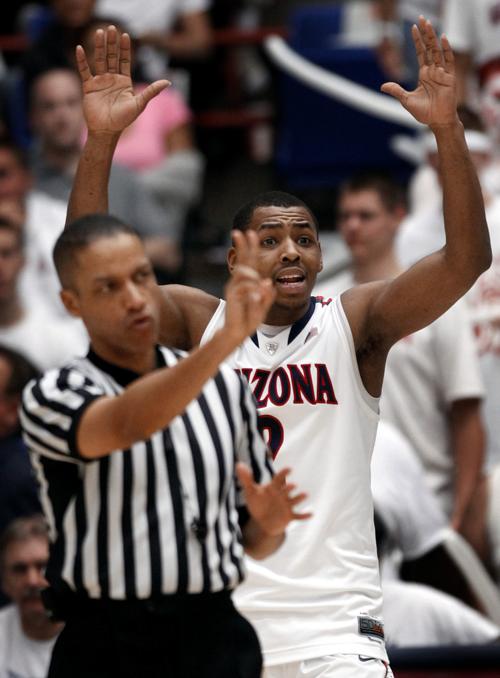You think a homestand against USC and UCLA is a burden? How would you like to identify and select 153 capable referees to work college basketball games this week?
That’s what Bobby Dibler must do this week. He must schedule referees to work 51 games, Thursday to Sunday, in the Pac-12, WAC, Big West, WCC, Big Sky and Mountain West conferences.
That’s 153 referees, all of them under intense scrutiny from sideline orators like Sean Miller to TV commentators like Don MacLean to the fan in Row 1, Section 1, whose “Go back to Foot Locker!” screams can be heard all the way to the Cochise Stronghold.
The numbers in demand exceed the quality of supply.
Over the weekend, MacLean told Pac-12 Networks viewers that the Cal-Oregon State game was “completely over-officiated.”
Indeed, referees whistled 61 fouls, highest in the league for 11 seasons. The game went on and on, requiring 2½ hours.
Mike Montgomery, who was the TV analyst for Saturday’s Arizona-Washington game, said the crowd at Alaska Airlines Arena was so volatile that it “disconcerts the officials.”
All of this falls on Dibler, the Pac-12’s director of basketball officials who two years ago also became the front man in the Western Officiating Consortium, which is responsible for assigning and evaluating referees for the Pac-12, Big West, WCC, WAC, Big Sky and Mountain West conferences.
It’s a long-term project in which short-term results are demanded.
A few weeks ago, Dibler was on the phone with angry Utah athletic director Chris Hill a few minutes after the Utes’ throbbing 80-77 loss to Arizona State, a game in which 51 fouls were called, about 15 more than a typical Pac-12 game.
Hill’s profane-laden outburst was heard across the hallway and into a closed room in which Utah coach Larry Krystkowiak was staging a press conference. The Pac-12 fined Hill $10,000.
Dibler’s phone is rarely quiet, especially on game nights. In turn, he burns the ears of dozens of officials. The back-and-forth, much of it unpleasant, is part of the business.
It is political as much as it is unpredictable.
For example, Michael Irving, who made the infamous “He touched the ball!” technical foul call on Sean Miller in 2013, has not worked an Arizona game since.
Yet Irving has called games in every other Pac-12 arena multiple times.
Dibler isn’t short on credentials. He officiated the Final Four championship games of 1981 and 1985, but he has taken on a job of monumental difficulty. His pool of available referees has about four alpha dog officials:
1. Verne Harris, 60, a former Denver real estate agent who began by officiating in the Rocky Mountain Athletic Conference in 1984. He has worked nine Final Fours.
2. Dave Hall, 63, a former Denver software executive who has worked two Final Fours and is so highly-sought that he worked 13 games in 14 days from Dec. 10-23.
3. Tony Padilla, 55, a bail bondsman from Sacramento, who called the 2016 and 2017 Final Fours.
4. Randy McCall, 57, a former high school sports administrator from Denver who has worked four Final Fours.
Padilla, Harris and Hall called the 2017 Pac-12 championship game, which is emblematic of the league’s top officials.
There is no sign of favoritism to a winning school like Arizona: Hall is the only ref from the Big Four who has called an Arizona conference game at McKale this season.
Dibler has more top choices than just four big-dog refs. John Higgins, who has worked eight Final Fours, usually takes two swings through the Pac-12 per season.
He is in such demand that he has worked five Pac-12 conference games this year, in addition to seven in the Big 12 and five in the ACC. He is based in Nebraska.
Higgins has already called 68 games; that’s about 3½ per week. Most of the big-game refs are paid about $3,000 per game, from which they pay their expenses.
Dibler has begun to infuse some top prospects into the rotation as those like Dick Cartmell, a six-time Final Four ref, works a diminished schedule. Cartmell has called just 29 games this season. The lead refs, like Hall and McCall, both have worked 56 games.
A top prospect in college basketball officiating isn’t much different than a Double-A shortstop itching for a chance in the big leagues. Two weeks ago, Dibler assigned one of his Double-A shortstops, Scott Brown, to work the Arizona-Utah game.
Brown, who has worked in the NBA development camp, was twice involved in much-discussed push-shove plays involving Allonzo Trier, and twice whistled fouls on Trier. Video reviews showed that Trier was the victim of Utah’s baiting tactics.
The McKale Center crowd almost rioted.
Brown has called just 19 games this season, and just three in the Pac-12. His routine assignments have been, say, North Dakota-Eastern Washington and Southern Utah-Weber State.
The conundrum is this: how does someone like Brown get ready for big-time showdowns in the Pac-12 if he’s always calling Big Sky games?
The demand on young referees isn’t any different than it is for Hall and McCall: don’t be intimidated, don’t be emotional, but do be consistent and do communicate.
But it’s still difficult to get it right. Arizona, for example, averages 22 free throw attempts in home Pac-12 games, and 17 on the road. Its opponents average 22 foul shots at home and, uncannily, 17 in Tucson.
So it seems to be a five-shot swing, no matter who is officiating, Hall, McCall or some guy just in from Weber State.





